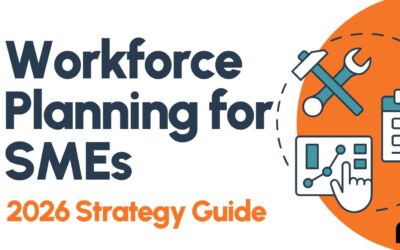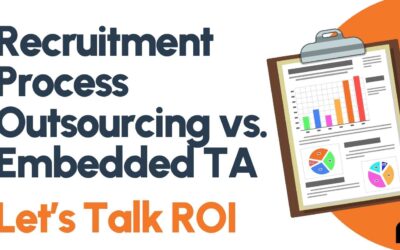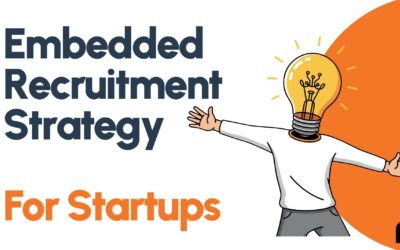Top 5 Talent Acquisition Strategies
In today’s world of recruitment, standing out and securing the best talent is more competitive than ever.
To help you stay ahead, we’ve outlined the Top 5 Talent Acquisition Strategies that will give you an edge. Whether you’re in HR, talent acquisition, or hiring for your own team, these tips will help you create a more effective hiring process.
Let’s dive in!

1. What Is Evidence-Based Recruiting (EBR)?
What is it? The first of our talent acquisition strategies is evidence-based recruiting. This method relies on data and research to make hiring decisions that are more predictive of success. Evidence-based recruiting helps organisations make better decisions by using measurable criteria rather than gut feelings. Companies like Google and Unilever have been incorporating this approach into their talent acquisition strategies for years, and it’s proven highly effective.
Why Does Evidence-Based Recruiting Work?
Think of EBR as the opposite of ‘winging it’ during recruitment. Instead of subjective methods, you’re using proven data to guide your hiring decisions. By building a process around clear, predictive criteria, you’re much more likely to make better hiring decisions.
Evidence-Based Recruiting Examples

1.Google’s Hiring Practices
Google is famous for its data-driven hiring process. They noticed early on that traditional hiring criteria like education or years of experience weren’t always the best indicators of a candidate’s success at the company. So, they shifted their approach to focus on other measurable factors, such as problem-solving skills and adaptability. Today, Google uses structured interviews, cognitive ability tests, and even personality assessments to ensure they hire individuals who will thrive in their unique work environment.

2. Unilever’s AI-Powered Recruitment
Unilever adopted an AI-based evidence recruiting process in which they use data to evaluate candidates in initial application stages. For example, they implemented game-based assessments to measure traits like risk-taking, resilience, and strategic thinking. Afterward, candidates record video interviews, which are analysed by AI. This data-driven approach not only reduced bias but also cut down hiring times by 75%, while improving the quality of new hires.

3. Work Samples at Automattic
At Automattic, the company behind WordPress, candidates go through a work trial. This involves giving potential hires a paid project similar to what they’d actually be doing on the job. This is a perfect example of using evidence from real-world tasks to see how a candidate performs, rather than relying on traditional interviews. Their success during the trial helps predict whether they’ll be a good fit long-term.
How Can You Implement EBR in Your Organisation?
- Start by collecting data: Look at what makes your current top performers successful. What skills, traits, or experiences do they share? Use that data to craft your ideal candidate profile.
- Use structured assessments: Implement tests or work samples that can predict job performance, such as problem-solving tasks or simulations.
- Evaluate continuously: Track your hiring results to see if the evidence-based methods are truly leading to better hires. If they’re not, refine your criteria based on the outcomes.

2. What Is Structured Interviewing and Why Does It Matter?
What is it? Structured interviewing is one of the most valuable talent acquisition strategies because it ensures fairness and objectivity in the hiring process. By asking all candidates the same set of questions in a consistent order, you create a level playing field.
This is one of the most tried-and-tested talent acquisition strategies for reducing bias and improving the quality of hires. Structured interviewing, when combined with other scientific approaches, results in more accurate hiring decisions.
What Types of Questions Should You Ask in a Structured Interview?
- Behavioural questions: Ask about past experiences to predict future behaviour. For example, “Can you tell me about a time when you overcame a significant challenge at work?”
- Situational questions: Present hypothetical scenarios, asking candidates how they would react. For instance, “How would you handle a project deadline being unexpectedly moved forward?”
How Does Structured Interviewing Improve Hiring Outcomes?
Research has shown that structured interviews, along with work samples and cognitive ability tests, are some of the best predictors of job performance. They are far more reliable than subjective factors like age or education.
Case study:
A Harvard Business Review case study found that giving candidates the interview questions in advance led to better outcomes. It allowed candidates to demonstrate their true abilities, rather than just showcasing who could perform best under pressure.

3. What Is a Skills-Based Hiring Approach?
Why is this important? There’s a shift happening – employers are moving away from education-based hiring and focusing more on a candidate’s actual skills. Why? Because job roles are evolving rapidly, and formal education is no longer a reliable indicator of someone’s ability to succeed in the workplace.
In fact, the US federal government has reduced education requirements for jobs, recognising the weak link between formal education and job performance. Skills are becoming the real differentiator.
How Can You Apply Skills-Based Hiring in Your Organisation?
With the help of modern tools like pre-employment testing platforms and learning management systems, you can:
- Identify the skills needed for the role
- Assess the current skill gaps in your workforce
- Provide training opportunities to close those gaps

Ready to put these strategies into action?
Our embedded recruiters integrate within 5 days to deliver fast, scalable hiring results.
4. How Can AI Improve Your Recruitment Process?
Why should you care about AI? AI is rapidly becoming a crucial part of many talent acquisition strategies. By leveraging AI, companies can automate certain parts of the hiring process, improving efficiency and accuracy. AI can help with tasks like screening resumes, predicting job performance, and even conducting video interviews.
This integration of AI into talent acquisition strategies not only saves time but also enhances the quality of hires by using data to guide decision-making.
For example, AI can:
- Predict time-to-hire using historical data.
- Match candidates to roles based on their CVs and past performance.
- Analyse candidate responses during video interviews using AI to assess facial expressions, tone, and word choice.
Chatbots and AI-driven platforms
AI-powered chatbots are now helping enhance candidate experience by answering FAQs or providing information about the role. And video interviews, now standard practice, can use AI to assess a candidate’s employability by analysing various behavioural cues.

5. Why Is Employer Branding Critical to Talent Acquisition?
Why is this critical? A strong employer brand is essential in today’s job market, and it plays a crucial role in your overall talent acquisition strategy. Candidates are now more selective and want to work for companies that reflect their values. Your talent acquisition strategies should include a focus on promoting your employer brand through digital channels, such as social media, job portals, and your company website.
How Do You Build a Strong Employer Brand That Attracts Talent?
- Make sure your Employee Value Proposition (EVP) is front and centre on job portals and your website.
- Share your wins! Celebrate company milestones, big projects, or employee successes.
- Most importantly, share employee stories—ideally in video format. Today’s talent wants to hear directly from your team about what it’s like working for your company.

Developing effective talent acquisition strategies is key to staying competitive in today’s evolving job market. By using evidence-based recruiting, structured interviews, a skills-based approach, AI integration, and strengthening your employer brand, you create a holistic set of talent acquisition strategies that attract and retain top talent.
Each of these talent acquisition strategies complements the others, forming a well-rounded approach to securing high-quality candidates. By investing in these strategies, your organisation will be better positioned to succeed in the competitive world of recruitment.
Ready to put these strategies into action?
Our embedded recruiters integrate within 5 days to deliver fast, scalable hiring results.
Known for our award-winning outsourcing expertise, Rent a Recruiter supports Talent Acquisition needs globally in IT, Engineering, Manufacturing, Construction, Finance, and Healthcare. We provide embedded recruitment solutions as your company scales.


